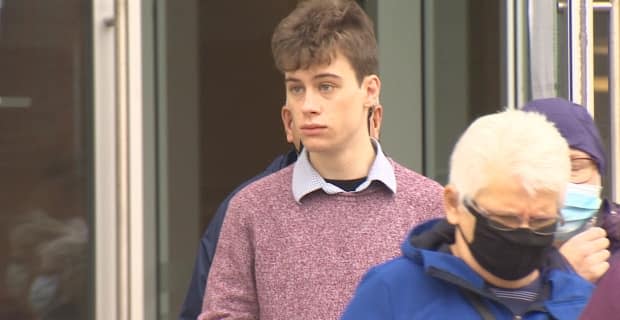Victim's head injury left 'no hope of survival'
When 54-year-old Anthony Dwyer arrived at the hospital late on July 13, 2018, his pupils were fixed and dilated, he didn't respond to any painful stimuli, and he had no cough or gag reflex.
All of those things are brain stem reflexes necessary to sustain life, said Crown prosecutor Chris Ryan, reading from an agreed statement of facts Thursday.
The absence of those reflexes indicates brain death, Ryan told the jury in the manslaughter trial of 21-year-old William Ronald Jordan.
Ryan said Dwyer was immediately intubated and put on life support when he arrived at the Saint John Regional Hospital.
Shortly after midnight, he was seen by a neurologist, who noted no improvement in his condition.
Reading from the agreed statement, Ryan said Dwyer's condition was "not compatible with life." He said there was no treatment that would alter that prognosis.

He said there was "no hope of survival."
Dwyer had sustained "significant trauma to the brain," along with fractures in his face.
Crown and defence also agreed that the brain injury that led to Dwyer's death was "likely caused" when he hit his head on the pavement immediately after being struck in the face by Jordan — and not the punch itself.
The agreed statement, which was entered as an exhibit Thursday, also stated that a blood sample was taken from Dwyer when he was admitted to hospital.
Crown prosecutor Jeremy Erickson told the court that an official with Coroner Services advised the Saint John Police Force that the sample would be tested for the presence of alcohol and drugs.
A few months later, investigators found out that the toxicology testing had never been done.
Nor could it be — since the sample had been destroyed.
No reason was given for why the testing hadn't been done.

Reading from the agreed statement, Erickson said Dwyer had consumed "an unknown quantity" of alcohol and cannabis. He was also taking prescription blood-thinning medication.
The agreed statement goes on to say that a waitress who tended to Dwyer's table that night remembers serving him five drinks, including three rum and Cokes.
On Thursday afternoon, the jury heard from one of the nurses who tended to Dwyer immediately after he landed on the pavement on the boardwalk.
Tanya Allen, a registered nurse, testified by video from Manitoba. She told the jury that she had been sitting with friends on a boardwalk patio when she noticed two men standing close together.
She said the older man appeared to be swaying, but not moving his feet. He pushed the younger man, who then "came in with a punch" after initially moving backwards from the push.
She said the older man went down with "a very loud thump."
Allen said everything then went quiet, and she could hear Dwyer struggling to breathe.

She and friend Laurel Webster, also a nurse, went to provide assistance.
Allen said blood was coming from Dwyer's nose and mouth. She said he was making "snoring respirations," which indicates that "you can't protect your airway."
Webster said they placed Dwyer on his side to help clear his airway. She said he didn't show any reaction to anything they did.
Allen said Dwyer's heart rate was initially very fast, but then it dropped.
Over the course of the trial this week, several witnesses testified about seeing the interaction between Jordan and Dwyer. Although they differ on some details — such as how Dwyer made contact with Jordan, and what hand Jordan used to punch Dwyer — they were consistent in saying Dwyer approached Jordan and was first to make physical contact.
Other witnesses said Dwyer demanded that Jordan give back a small cigar he had given to another man. Jordan refused and that's when Dwyer pushed him.
A pathologist is scheduled to testify on Friday morning when the trial continues.


